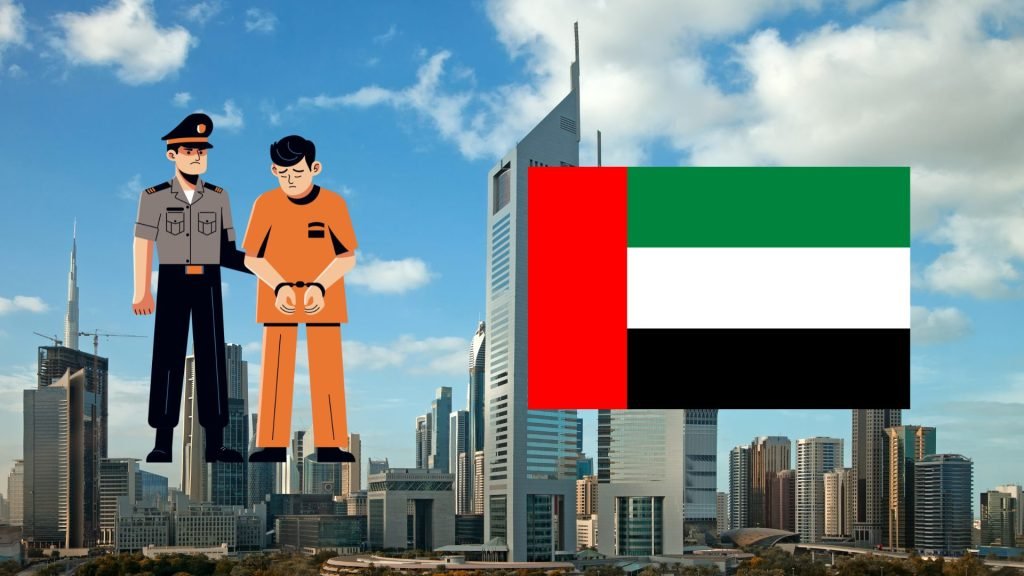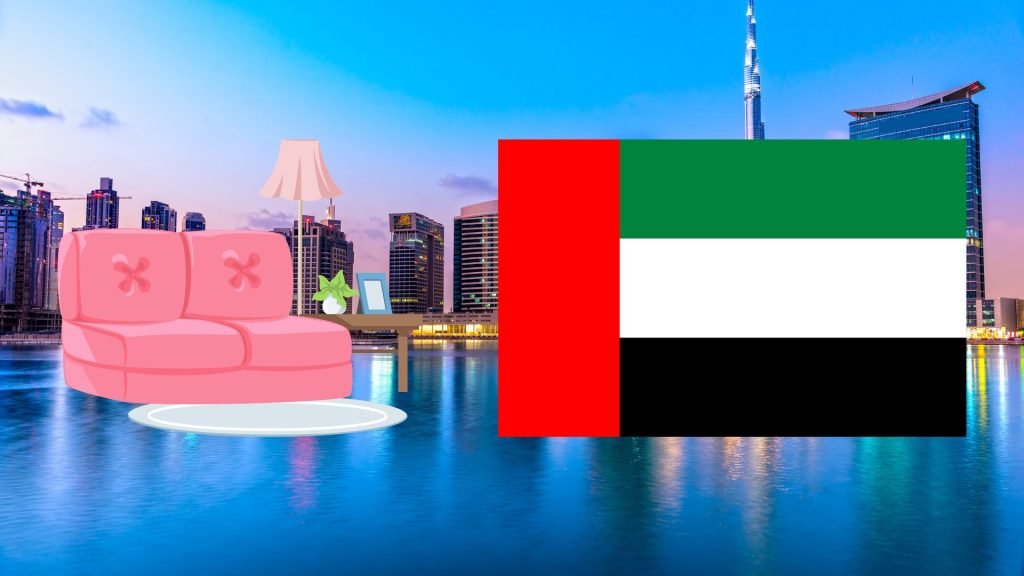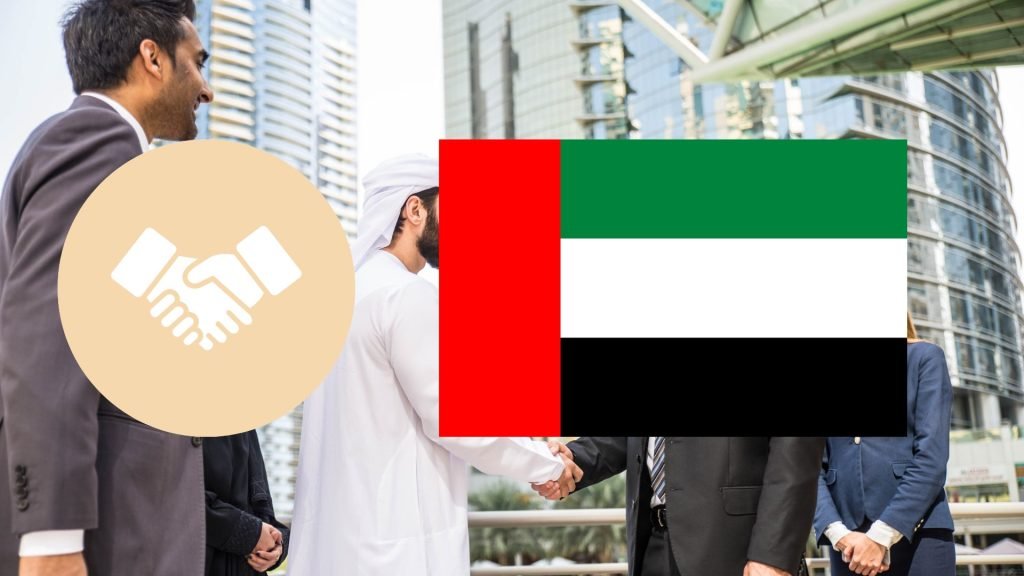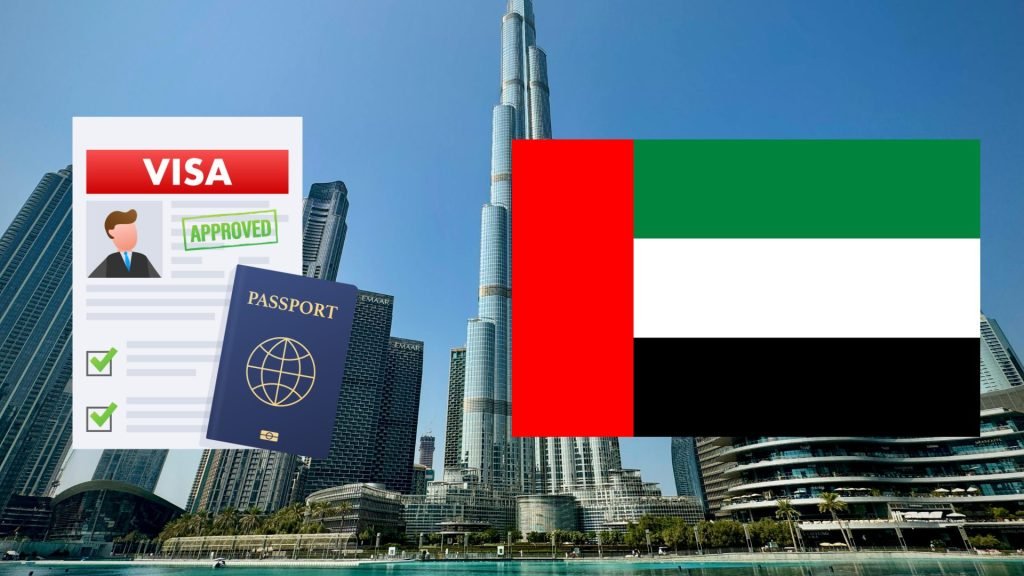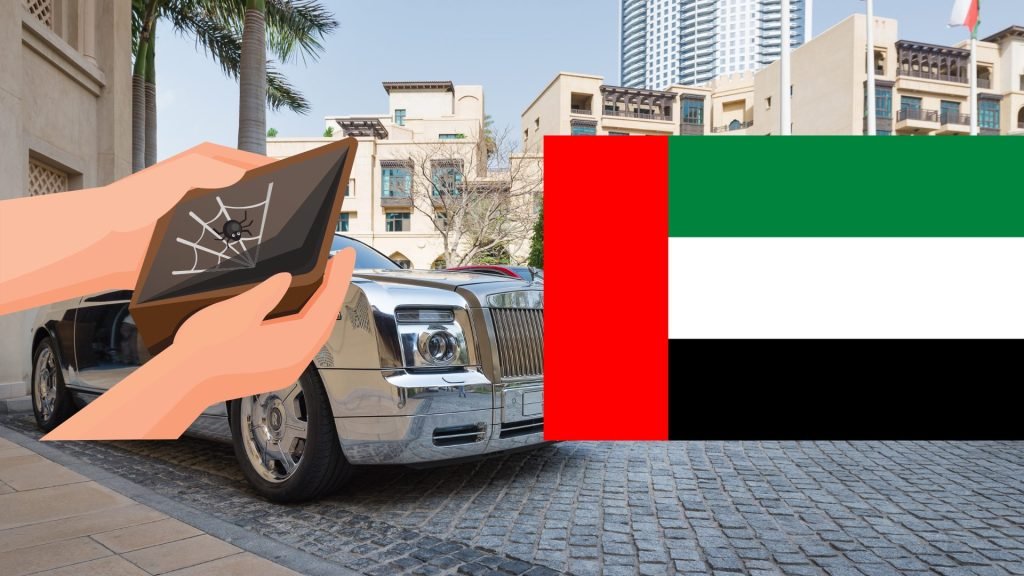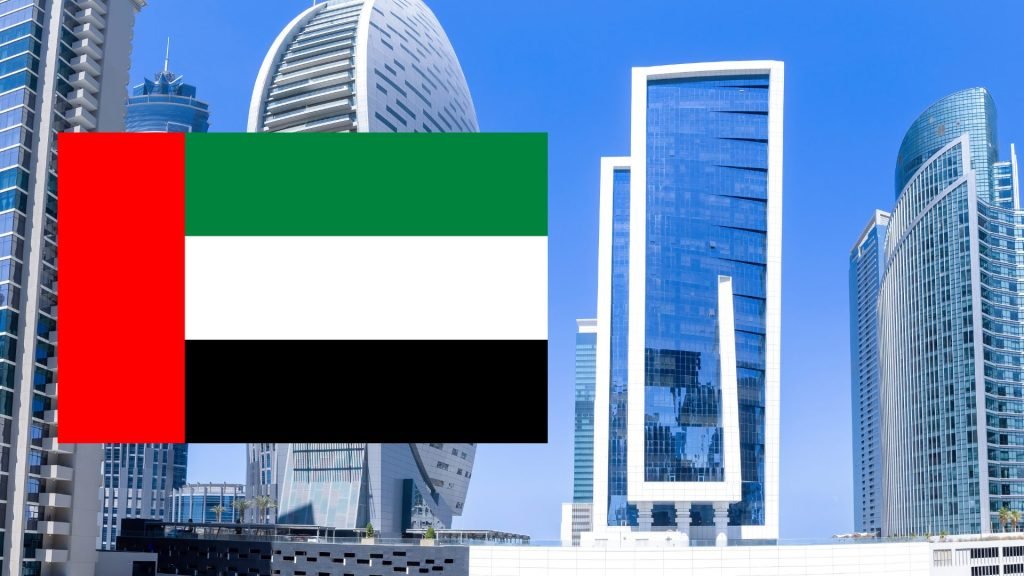What about schools in Dubai? Dubai has been a popular destination for expats from all over the world for years. Not only because of the tax-free income, comfort and safety, but also because of the good schools. For families with children who want to emigrate to Dubai, the quality of education plays an important role.
One of the main reasons why people choose education in Dubai is the international diversity in schools. In Dubai, you can find schools that offer education in virtually every conceivable curriculum: British, American, French, German, Indian, and of course the International Baccalaureate (IB).
In addition, the Knowledge and Human Development Authority (KHDA) – the government agency that oversees private schools – ensures that the quality of education remains good.
In short: whether you come from Europe, Asia or North America, chances are high that you will find a school in Dubai that meets the educational needs and standards you are accustomed to.

How Does the School System in Dubai Work?
The education system in Dubai consists of two main types: public education (for Emiratis) and private education (for most expats). The language of instruction in public schools is Arabic and these schools are exclusively accessible to children with Emirati nationality (so they really come from the UAE).
In Dubai, more than 90% of the people are expats, which is why there are also many private schools. Most expats choose private schools, which offer education in English (or other languages depending on the curriculum).
In Dubai, formal education starts from the age of four or five, depending on the chosen curriculum.
The school system in Dubai is divided into different phases:
- Early Years/Foundation/Kindergarten
- Primary/Elementary
- Secondary/High School
The transition between phases usually goes smoothly, especially within schools that offer multiple phases. The advantage of this is that children can often stay at the same school from a young age until their final exams.
What is the Role of KHDA in Dubai’s Education System?
The Knowledge and Human Development Authority (KHDA) is responsible for overseeing the quality of private education in Dubai. For parents, this means a great advantage: the performance and standards of schools are transparent and verifiable.
KHDA conducts annual inspections and gives schools ratings in five categories: Outstanding, Very Good, Good, Acceptable and Weak. These ratings are publicly available, allowing parents to easily compare schools based on this assessment.
But KHDA does more than just inspect. The agency also promotes innovation, wellness policies and parent involvement. Thus, schools are not only assessed on academic performance, but also on matters such as student satisfaction, mental support and things like preparation for higher education.
The role of KHDA is therefore fundamental in maintaining the high standard that characterizes education in Dubai today.
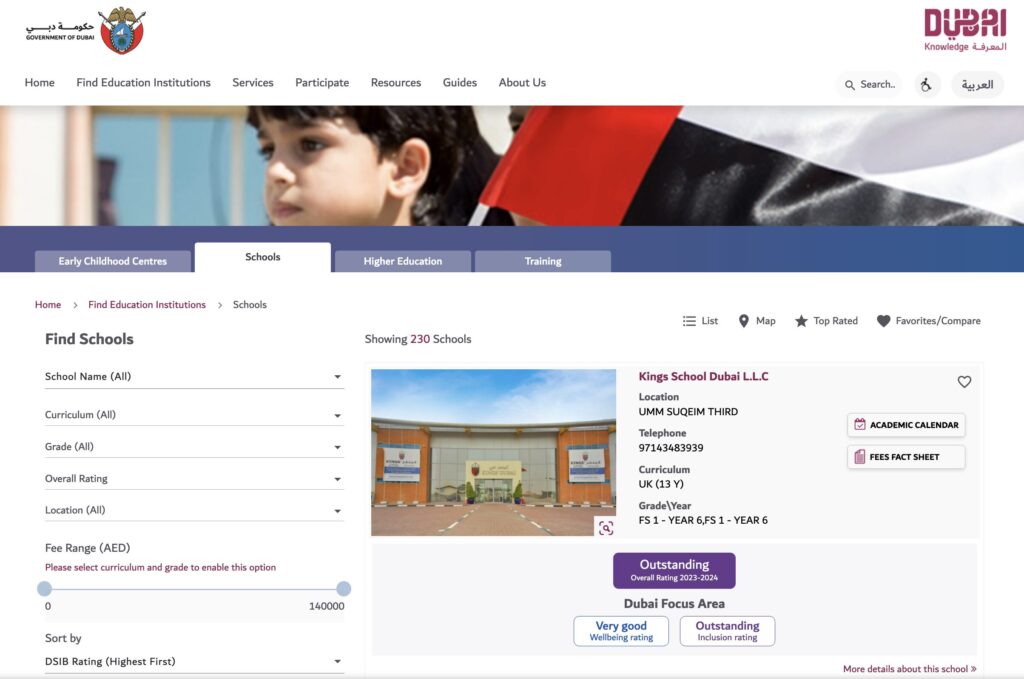
Which Curricula are Available in Dubai?
Dubai is known for its wide range of international curricula. Thanks to the great diversity among the population, parents can choose from educational systems that match their cultural background or future plans for their children. Because there are so many cultures, the differences between curricula are also quite large.
The most common curricula in Dubai are:
- British curriculum (National Curriculum of England): Known for its structure with GCSEs, IGCSEs and A-Levels. Popular among European and Asian families.
- American curriculum: More flexible in setup, with emphasis on broad development. Often ends with the SAT or Advanced Placement (AP) exam.
- International Baccalaureate (IB): A globally recognized program that stimulates critical thinking, research and intercultural understanding.
- Indian curriculum (CBSE/ICSE): For families originating from India or surrounding countries.
- French, German, Canadian, Russian, Japanese and other curricula: Specific schools offer education according to these national models, often supported by embassies or governments.
The choice of curriculum often relates to the intended further education. For example, children who want to study in the United Kingdom usually choose the British curriculum, while the American curriculum is popular among students aiming for universities in the US or Canada.

Top 10 Best Rated Schools in Dubai (Based on KHDA Reputation)
Dubai has hundreds of private schools, but some of these schools truly stand out due to their excellent education and global reputation. Below is a selection of the top 10 schools in Dubai, based on KHDA inspections and overall parent satisfaction:
- GEMS Dubai American Academy – American curriculum with IB option, known for its technology and STEM programs.
- Dubai College – One of the most prestigious British schools with excellent A-Level results.
- Repton School Dubai – British boarding-style school with IB and IGCSE options.
- Jumeirah English Speaking School (JESS) – Strong British school with a focus on personal growth.
- King’s School Dubai – Excellently rated by KHDA; consistently ‘Outstanding’.
- Nord Anglia International School – Global network of top schools with collaborations with MIT and Juilliard.
- Dubai International Academy – Full IB program; highly regarded for academic success.
- Swiss International Scientific School – Offers bilingual education (English/French) with IB.
- Brighton College Dubai – Branch of the famous Brighton College UK; known for academic achievements.
- Deira International School – IB and British curriculum, with an emphasis on innovation and inclusivity.
School Choice: What should Expats Consider?
Choosing the right school is perhaps the most important decision for families in Dubai. There are several factors to consider when choosing a school in Dubai:
- Location: Many families look for a school close to home to limit travel time. Neighborhoods in Dubai such as Arabian Ranches, Al Barsha, Dubai Hills, and Jumeirah have multiple good schools.
- Curriculum: Does the educational model align with your home country or future study plans? Choose a curriculum that fits with further education plans.
- Costs: School fees can vary greatly. Some top schools charge more than AED 80,000 (approximately €20,000) per year. The school costs also differ per year, for example, in the first year of primary school, you pay about 45,000 AED per year, and in the final year, you pay 80,000 AED per year.
- Facilities: Consider sports fields, music studios, art rooms, and laboratories.
- Extra activities: A school that offers sports, music, drama, or clubs contributes to a balanced development.
- Admission requirements: Some top schools have strict selection procedures or waiting lists.
A good tip: always plan a personal tour and talk to other parents before making a final decision.
What are the Average School Costs in Dubai?
In Dubai, there are only private schools for expats. Private schools are always more expensive than public schools, even in your home country.
The costs for private education in Dubai vary enormously and depend on factors such as curriculum, location, age of the child, and the overall reputation of the school.
What are the average school costs in Dubai? On average, the annual school fees for private schools range between AED 15,000 and AED 120,000 per child per year.
A general indication of what a school costs in Dubai:
- Budget-friendly schools: AED 15,000 – 30,000 per year
- Middle-class schools: AED 30,000 – 60,000 per year
- Top schools / premium schools: AED 60,000 – 120,000+ per year
What Is Usually Included?
- Tuition typically covers the educational program, use of facilities, and textbooks.
- Items such as uniforms, transportation, extracurricular activities, lunch, and school trips are often additional costs.
- Some schools also charge registration fees, annual re-enrollment fees, and deposits.
Note: Some schools offer discounts for multiple children, payment plans, or scholarships. Always inquire about this at the school. You can download a fact sheet for each school on the KHDA website to easily see the price.
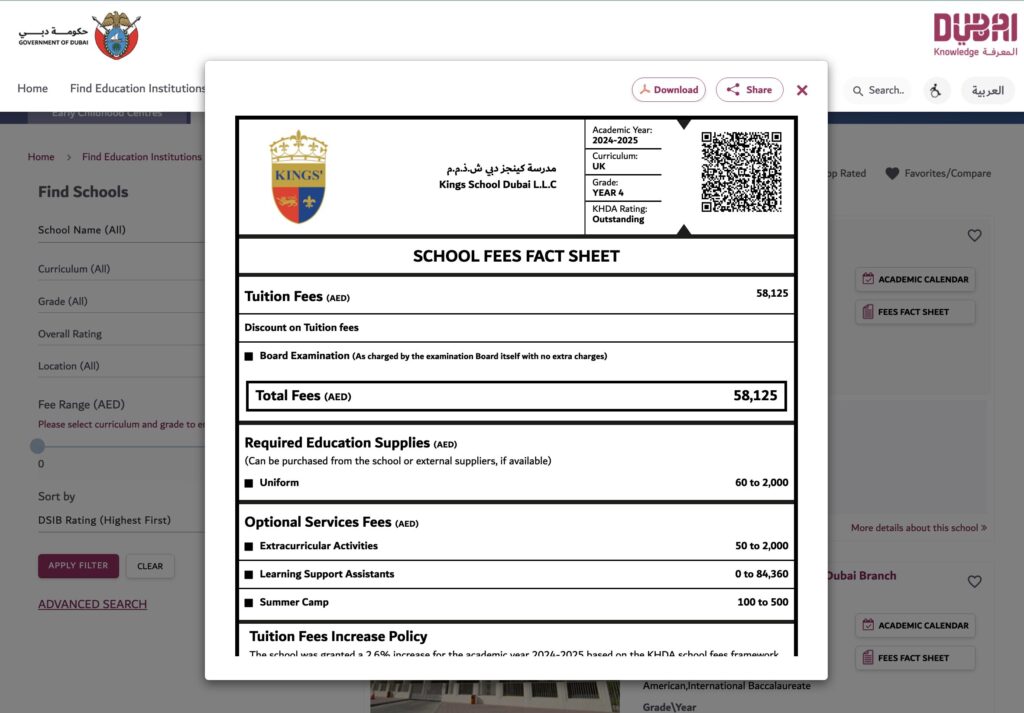
Schools with Special Facilities and Additional Support
Dubai is increasingly focusing on inclusive education and offers various opportunities for children with specific needs.
For children with learning disabilities (such as dyslexia), ADHD, autism, or physical disabilities, there are schools with specialized programs and counselors. Schools in Dubai that excel in this are:
- Swiss International Scientific School – known for its inclusivity and support team.
- Uptown International School – offers learning support in a safe, stimulating environment.
- GEMS Education schools – often have a ‘Learning Support’ department for individual guidance.
There are also schools focused on gifted students, with challenging curricula, enrichment programs, and the possibility of accelerated learning.
As a parent, it is important to check with the school:
- Whether there is a specialized support team available
- How they handle personal learning goals and individual plans (IEPs)
- What expertise the staff has
How Do You Enroll your Child in a School in Dubai?
The enrollment process at private schools in Dubai varies by school, but generally follows a similar path. Below is the standard procedure in steps:
- Online registration or information request via the school’s website
- Submission of documents, such as passport, visa, birth certificate, previous school reports
- Admission interview or test (depending on class level and school policy)
- Waiting list (if necessary) – some popular schools fill up quickly
- Admission offer and payment of registration fee (often non-refundable)
- Final placement and receipt of school start information
Tips for Finding a School in Dubai
- Start the process 6 to 12 months before the desired start date
- Check if your child needs a visa and Emirates ID for enrollment
- Ask about the re-enrollment deadline, especially if you want to enroll multiple children
Yes, at most private international schools in Dubai, English is the language of instruction, regardless of the curriculum. Exceptions are schools with specific national curricula, such as French, German, or Japanese, where the respective language is preferred.
All non-Arabic students are required to take Arabic as a second language. For Arabic students, taking Arabic as a first language is mandatory. Islamic students must also follow Islamic education.
Many top schools require an admission test or interview, especially for higher grades. This helps the school determine the student’s level and provide appropriate guidance.
The average class size usually ranges between 18 and 25 students per class. Top schools with higher fees often have smaller classes and more individual attention.
